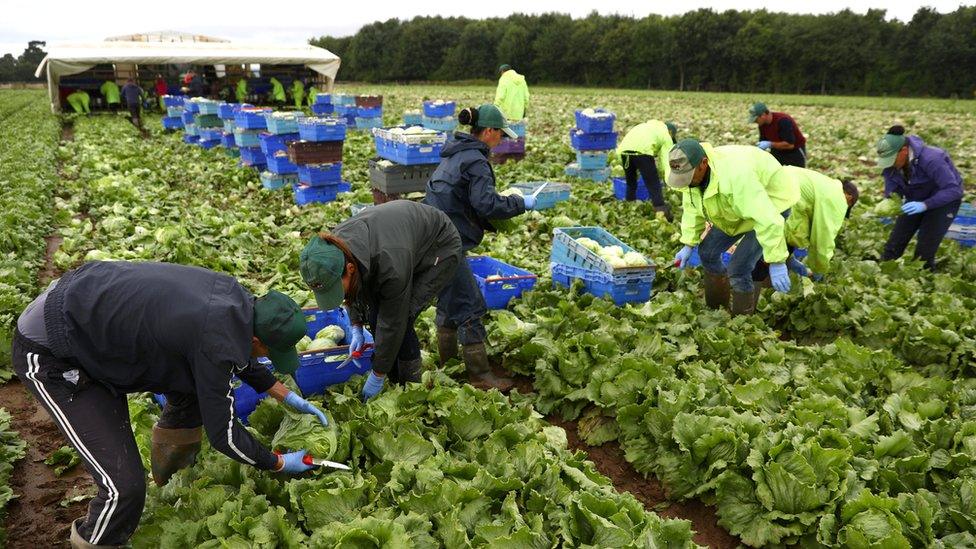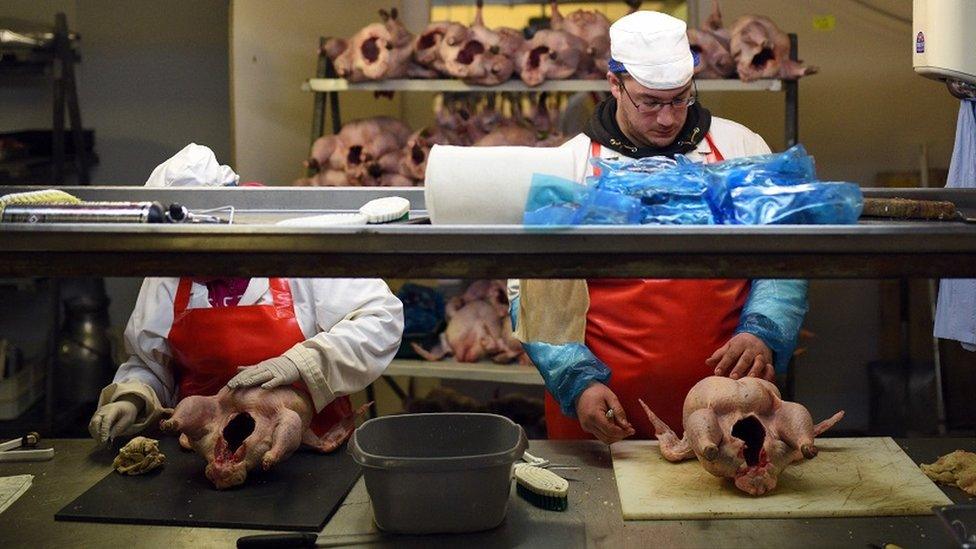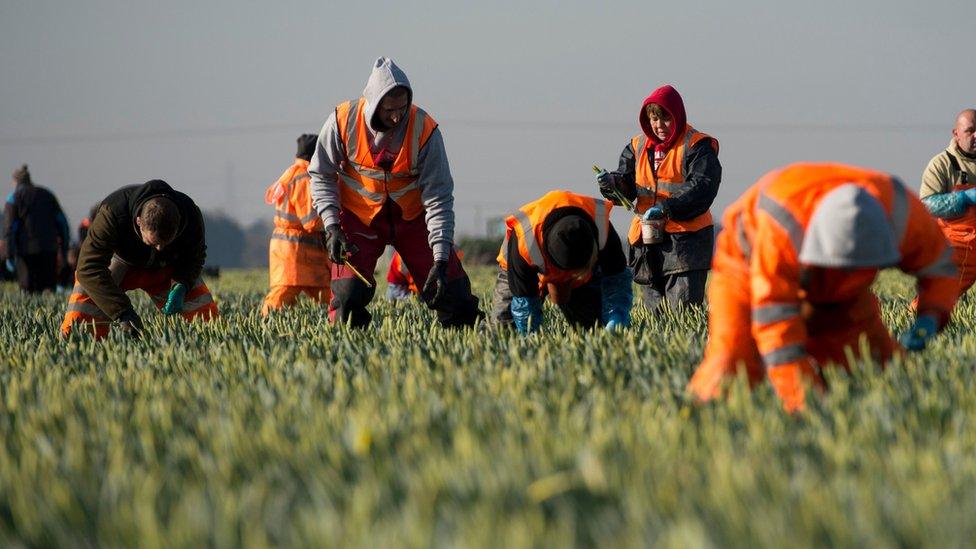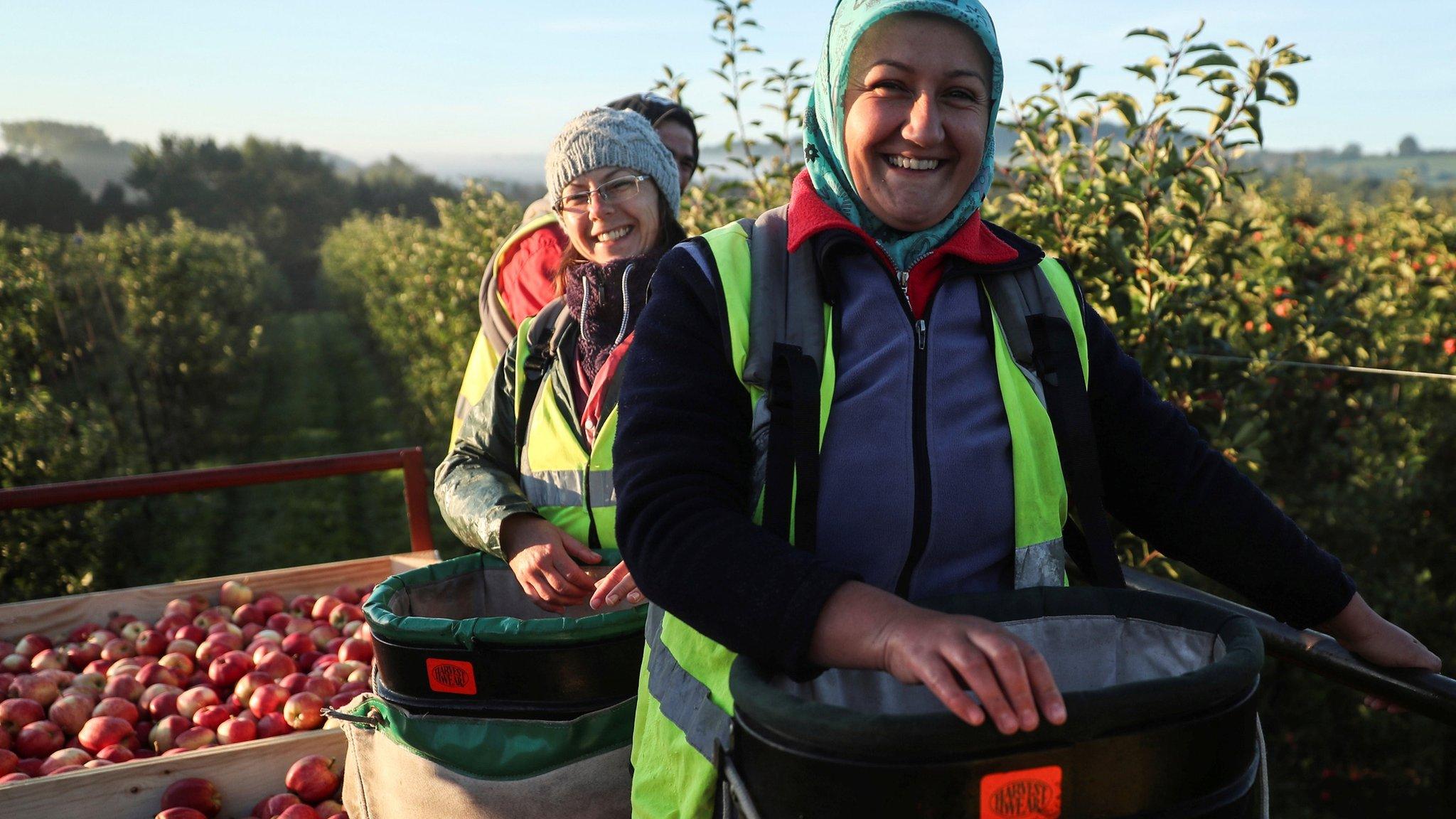Food industry warns of Brexit workforce shortage
- Published
- comments

The UK food industry has warned that a Brexit workforce shortage could leave a third of its businesses unviable.
The Food and Drink Federation said: "Our sector faces a rapidly approaching workforce shortage and skills gap."
Its survey of the "farm-to-fork" supply chain said 31% of businesses had already seen EU workers leave the UK.
The FDA's survey was conducted across a wide range of respected trade bodies, including the British Retail Consortium and the National Famers Union.
It added that almost half of those businesses surveyed said EU nationals working in the UK were considering leaving.
Big net migration fall since Brexit vote, latest estimates show
The federation is calling on the government to guarantee the rights of nationals from across the European Economic Area.
Ian Wright, its director-general, said: "It is only a matter of time before the uncertainty reported by businesses results in an irreversible exit of EU workers from these shores.
"Without our dedicated and valued workforce we would be unable to feed the nation."
In April a report by the Commons Environment Food and Rural Affairs Committee said:, external "Evidence... suggests the current problem is in danger of becoming a crisis if urgent measures are not taken to fill the gaps in labour supply."

A "cliff-edge" Brexit would disrupt the whole food supply chain, the FDF warns
A government spokesperson said: "In June we published our offer to protect the rights of EU citizens in the UK, confirming no-one living here lawfully will be asked to leave when we exit the EU and they will have a grace period to regularise their status."
The federation said it had welcomed the government's announcement. However, of the businesses it surveyed:
47% said EU nationals were considering leaving the UK
36% said they would become unviable if they had no access to EU workers
31% reported EU nationals leaving since the referendum
17% said they may relocate overseas if they had no access to EU nationals
The federation is calling on the government to ensure there is no abrupt reduction in the number of EU workers in the UK the day the country leaves the EU.
Mr Wright told the BBC: "What we don't want is a sudden switch-off of the availability of EU workers who are part of the lifeblood of our industry."

Almost a third of food and drink firms have seen EU workers leave the UK
He added that there were a lot of practicalities in the government's plans for EU workers "that we don't know yet".
"We don't know how much it's going to cost. We don't know how dependents will be treated," he told BBC Radio 4's Today Programme.
"And crucially, in order to believe the scheme is going to work, you have to believe the Home Office can register two and a half million Europeans in a year. That defies some level of belief."
Last month the National Farmers Union deputy president Minette Batters said: "The NFU cannot emphasise enough the urgent need for clarity and certainty on access to a competent and reliable workforce and all other issues relating to Brexit.
"The industry needs commitments that there will be sufficient numbers of permanent and seasonal workers from outside the UK post-Brexit."
Immigration
The government said in a statement: "After we leave the EU we must have an immigration system which works in the best interests of the UK.
"Crucial to the development of this will be the views from a range of businesses, including the agricultural, food, drink and manufacturing sectors.
"We will be setting out our initial proposals for this system in the autumn but we have already been clear there will be an implementation period after we leave the EU to avoid a cliff edge for businesses."
In the longer term, the federation accepts it will have to adjust to the reduction in the number of EU workers.
"Over time [training local workers] is something that will have to happen as a result of the Brexit vote. We recognise that immigration was a big factor in the Brexit vote," Mr Wright said.
To deal with fewer foreign workers, the federation will have a strong emphasis on building skills through apprenticeships and investment in technology to support automation, it said.
The survey was co-ordinated by the FDA, and as well as the BRC and the NFU, it gathered results from trade bodies the Association of Labour Providers, the British Beer and Pub Association, the British Hospitality Association, the Food and Drink Federation, and the Fresh Produce Consortium.
It said that across the various workforce surveys there were 627 responses, collectively representing almost a quarter of the food chain's total employment of four million people.
- Published5 July 2016

- Published9 December 2016

- Published31 May 2017
